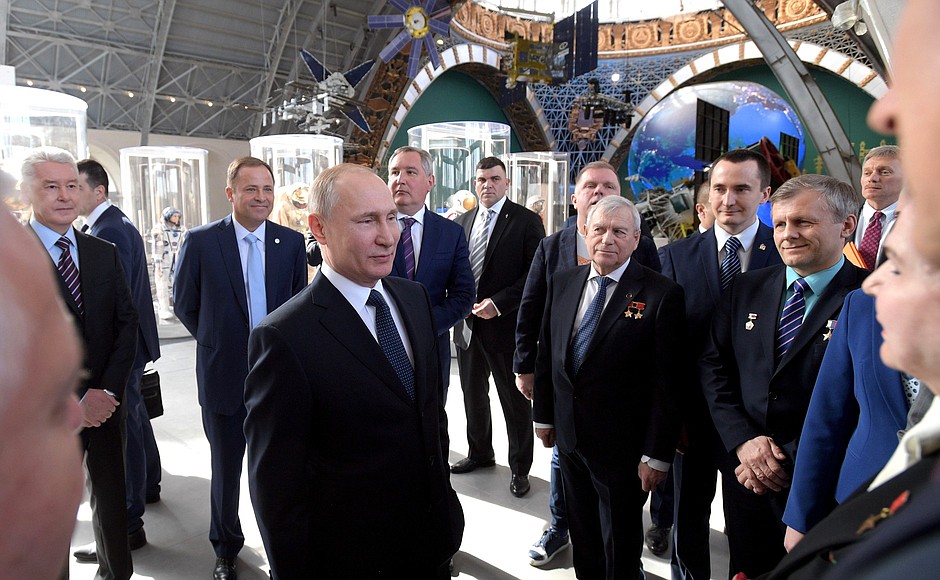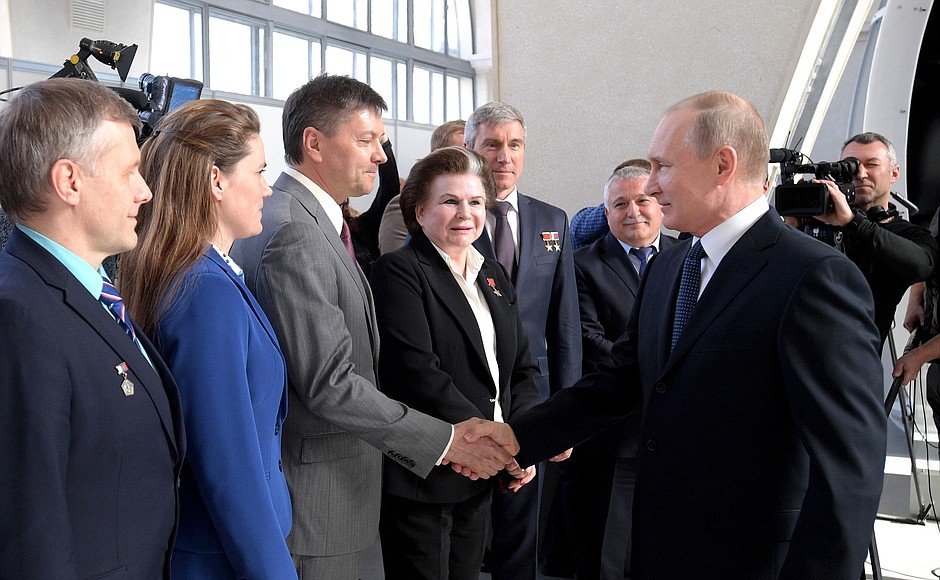President of Russia Vladimir Putin: Good afternoon.
I would like to congratulate current and former space industry workers on Cosmonautics Day.
I would like to tell space industry veterans that the Soviet Union benefited and Russia still benefits a great deal from the advances you achieved. Despite the challenging times we are all aware of, we are expanding operations in this sector, gradually and steadily. This is essential for the country’s defence capability, as well as economic development. You know this better than I do. We will keep improving communication, observation and other such things.
You also know that a new space launch centre has been built in Russia.
World’s first woman cosmonaut Valentina Tereshkova: Yes, we have been there.
Vladimir Putin: An entire city will gradually grow around this facility. But this is not just about a new launch pad. I expect this initiative to bring about the emergence of a new high-technology cluster in Russia’s Far East. We will be proactive in our efforts to achieve this vision.
Valentina Tereshkova: Mr President, first of all, on behalf of my colleagues, those who are here today and those who are absent, let me congratulate you on your re-election.
Vladimir Putin: Thank you very much.
Valentina Tereshkova: We are pleased that you will support space science development, and we are glad that with your help we will be developing the Moon exploration programme and the outer space exploration programme, including Mars exploration.
Vladimir Putin: Of course. You may know that in February, if I am not mistaken, an executive order was signed on creating a super-heavy rocket, which will be designed for outer space – first in a near-moon orbit, and then to deliver cargo to the Moon to create an appropriate station there.
Executive Director for Manned Space Programmes of the Federal Space Agency, veteran cosmonaut Sergei Krikalyov: And then for manned flights.
Vladimir Putin: Then for manned flights; we need a manned transport spacecraft. So we will continue to explore both geostationary and lunar orbits. And a more remote perspective, but it will also be implemented, of course, is working on Mars programmes. There are two programmes. Hopefully, we will take part in them. Corresponding agreements have been signed with our partners. Thank God, this field of activity is not being influenced by problems in politics. Therefore, I hope that everything will develop, since it is in the interests of everyone, in the interests of all humankind.
Valentina Tereshkova: They fly on our ships.
Vladimir Putin: Yes, they do…
Sergei Krikalyov: In fact, we fly together. We take risks together and help each other.
Vladimir Putin: Yes. This is a sphere of activity that unites people. I hope it will continue to be this way.
Valentina Tereshkova: We hope that this programme will bring not only new achievements, but also glory to our country.
Thank you very much for your support.
Vladimir Putin: Don’t mention it.
Valentina Tereshkova: And we will do our best. Why are you so silent, everyone? Will we do our best?
Test-cosmonaut of the Gagarin Research and Test Cosmonaut Training Centre Anna Kikina: Yes. Mr President, you said that we are going to fly to the Moon, didn’t you?
Vladimir Putin: Yes. You know that this programme is designed until 2030, at least its first part. The Federatsiya spacecraft is now nearing completion, while work has begun on creating a super-heavy rocket for the Moon projects. So there are no doubts here, we will keep working at it and will keep carrying out this programme.
Anna Kikina: That is great, thank you.
Vladimir Putin: First the lunar orbit, circumnavigation, there are space stations to build for the lunar orbit. First, the space station, and then the modules on the Moon itself. In any case, this is how we plan to proceed. We will be able to do this, I have no doubt.
Valentina Tereshkova: It is sad that the years go by so quickly.
Vladimir Putin: Do you want to fly to the Moon?
Valentina Tereshkova: No, Sergei Korolyov and I once agreed to go to Mars.
Vladimir Putin: It will not be easy to go to Mars.
Instructor-test-cosmonaut of the Gagarin Research and Test Cosmonaut Training Centre Fyodor Yurchikhin: There will be apple trees blooming on Mars (line from a popular Russian song).
Vladimir Putin: Yes, exactly. Here, people used to grow apple trees for planting on Mars, sold apple tree seedlings, too.
Sergei Krikalyov: By the way, have things changed here, in the pavilion? It actually looks the way it used to.
Vladimir Putin: It looks better.
Sergei Krikalyov: Better than before.
Vladimir Putin: More advanced technologies are being used.
Sergei Krikalyov: Speaking of future programmes: we will always need new staff, so this pavilion could become a great place to interest young people in this area.
Vladimir Putin: Exactly.
Sergei Krikalyov: Perhaps, we should start hosting annual conferences of some sort here?
Vladimir Putin: There is a conference room seating 300 people, so I think it will be used, I am sure it will. See, there are people from tech-parks sitting there downstairs, working their magic.
Valentina Tereshkova: We could make these conferences international events.
Vladimir Putin: Of course. Why not?
Valentina Tereshkova: And invite our colleagues from other countries, cosmonauts.
Sergei Krikalyov: We already have annual cosmonaut meetings, perhaps we could organise similar meetings in a place like this.
Vladimir Putin: And, speaking of the ExoMars programme, the next part of the programme – the documents with our partners have already been signed; no one is backing out yet. So we will implement it.
Fyodor Yurchikhin: Today, Mr Rogozin suggested that we set the date, October 4th, to host the annual international symposium on manned spaceflight right here.
Vladimir Putin: This can be done.
Fyodor Yurchikhin: And again going back to the Moon.
Mr President, will Russia continue to be an active participant in international projects, programmes and, in particular, the widely discussed international Deep Space Gateway? What do you think?
Vladimir Putin: I just said, I can confirm this. We are not going to disrupt anything here, to pull out of these programmes. We intend to cooperate. Our partners in Moon and Mars exploration are the United States, Canada, Japan and the European Union.
Sergei Krikalyov: In fact, everyone who is working at the ISS. We continue working with them, discussing how to move forward.
Vladimir Putin: Those who have the technology and the desire to do this. We have both the technology and the desire, and our financial opportunities are increasing. So all these plans will be implemented. They are interesting for the country, and in general for all of humanity.
This programme is very good, as I said, the first part is designed until 2030. Although the first tests of the super-heavy rocket are expected to be held in about 10 years, if we can accelerate it, we will. One more launch pad needs to be created at the Vostochny Space Launch Centre.
Sergey Krikalyov: The launch-site complex.
Vladimir Putin: The launch-site complex, launch pad.
Valentina Tereshkova: Will it be launched from Vostochny?
Vladimir Putin: From Vostochny, yes. And a launch pad needs to be built there. But we are already planning and, probably, we will get down to work soon. There is already a pad for a heavy rocket, and now we need a pad for a super-heavy rocket. It will be done simultaneously. When we discussed all these issues, we agreed that one project should be synchronised with the other, so that we can have the launch pads and rockets simultaneously. Otherwise it makes no sense. And a good city can be built there, the city of Tsiolkovsky; it is starting to grow.
Valentina Tereshkova: The construction is already underway: we saw it and met with the builders.
Vladimir Putin: Yes, foundations have been laid, it will be beautiful, and hopefully, it will be convenient and comfortable for people to live and work there. And it is very important that we do this in the Far East – we are creating an additional cluster there. We have always had an aviation cluster there, which is being re-created and strengthened, first, combat aircraft – Su jets; we are reviving the shipbuilding centre in the north, and now we are creating a completely new aerospace cluster.
Valentina Tereshkova: Yes, development of the Far East is a great thing.
Vladimir Putin: Yes, yes, of course. And I want training programmes to be adjusted for those areas of activity that will be relevant for the Far East – shipbuilding, aircraft building, cosmonautics and marine biology. I am referring to the training programmes at Far Eastern Federal University. In fact, all the directions and all the components of this programme are available; they have been worked out, and it is only necessary to increase our efforts for implementation. I am sure it will be so.
Valentina Tereshkova: We were lucky.
Vladimir Putin: I congratulate you once again.
Remark: I wish all the best! Good health!
Vladimir Putin: Goodbye. Greetings to you on your day!
Remark: Greetings to you too!

